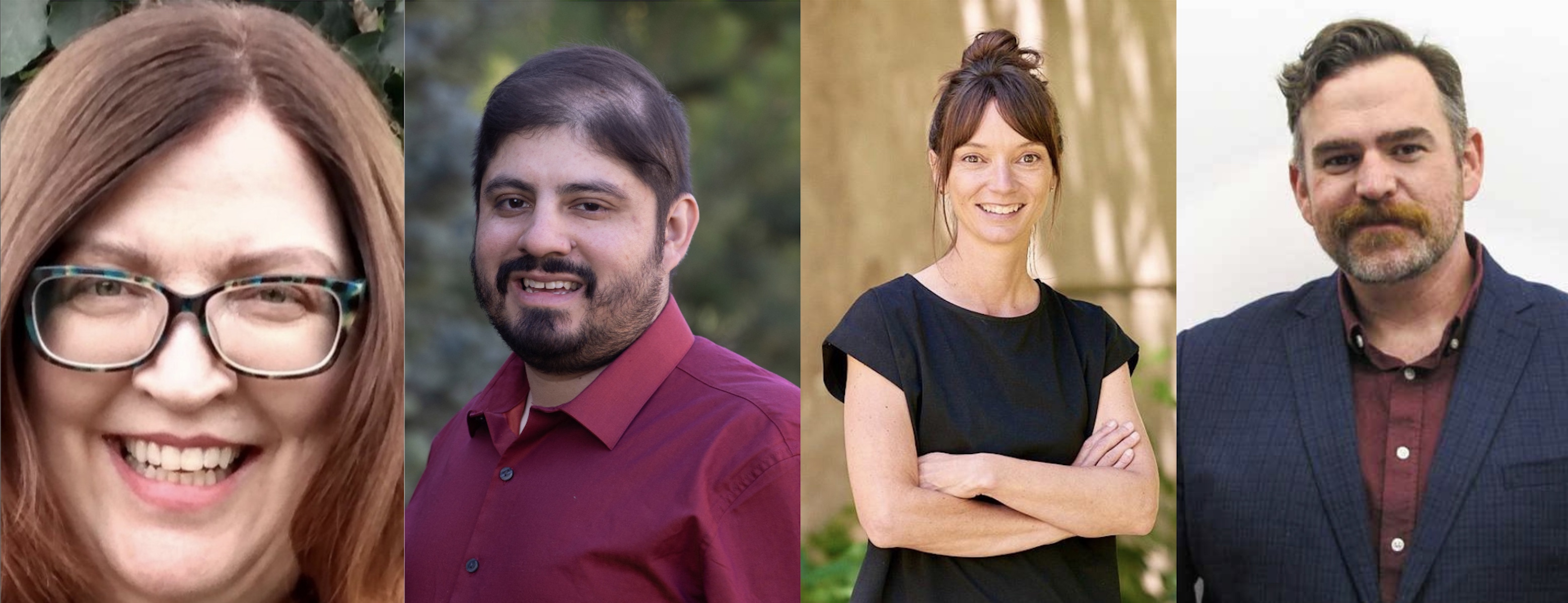
Professor Christine Cooper-Rompato, Lecturer Michael Dubon,
Assistant Professor Amber Caron, & Assistant Professor Travis Franks
In honor of the National First-generation College Celebration day on November 8th, English Department faculty have shared some of their personal experiences working with and being first-generation college students. Each member responded to three questions: What do you love most about first-gen students? What do you wish first-gen students knew? How did being a first-gen student shape your experience (then and now)?
“I love working with first-gen students because they aren’t afraid of challenging themselves with new classes, texts, and ideas,” notes Professor Christine Cooper-Rompato. “I wish first-gen students knew that the squeaky wheel gets the grease—they should seek out help and/or guidance from professors and speak up in class when they agree or disagree with something. Be bold!” On her own experience as a first-generation college student, Christine reflects, “A certain family member used to ask me what I was going to do with what (in their mind) was an impractical English major—I told them I could be a journalist (which I didn’t plan to do), and they were satisfied. When I became a medievalist, that same family member asked what could I possibly do with that degree—I said the most concrete thing I could think of (which was completely impossible)—I planned on finding an original Chaucer manuscript in someone’s attic. The family member thought that was a good idea! So, what I learned from those interactions was that it’s okay to describe what you do in ways that your family will appreciate.”
On his approach to teaching, Lecturer Michael Dubon states, “One of my goals as an educator is to impart to students the skills and strategies I wish had been shared with me because I know firsthand how difficult it is for a first-gen student to put themselves through school while not knowing the mechanisms of college. I didn't realize so much of what was left unsaid in the college process: that there were academic advisors to help degree plan, that there were such things as summer and winter classes, that I could start career prepping while I was still in college. However, as an instructor, I make sure to support first generation students as much as possible towards their academic and personal success. As a result, my pedagogical scholarship emphasizes supporting first-generation students and giving students the tools to self-advocate in college and beyond.
Assistant Professor Amber Caron reflects, “What I remember most about my first year of college was the mixture of thrill and terror—the thrill of being in lectures, classes, and seminars that, on a daily basis, blew my mind, and the terror that someone would figure out I wasn’t supposed to be there and tell me I had to go. (I was especially suspicious of the Bursar’s Office and thought it best to ignore their phone messages and letters. Don’t do that.) To my fellow first-gen-ers reading this—know that you are exactly where you are supposed to be and we are lucky to have you. Ask your questions. Follow your interests. Seek out friends and mentors. Apply for scholarships. Definitely respond to the Bursar’s Office. Slowly the fear will begin to subside, though, I’m sorry to say, it might never completely go away. And that’s okay, too. Trust that everyone is moving through the world a little bit terrified.
Assistant Professor Travis Franks recalls the struggle with imposter syndrome as a first-generation college student. He says, “There are good and bad elements to it. I still struggle with imposter syndrome from time to time, even as (or maybe especially as) a new assistant professor. But I also know that I can do the work and that I have people around me who are willing to help me succeed. I still seek out trusted mentors because there are still so many things that I don't know about working in academia. But I also feel a lot of pride in having made it this far, especially now that I have the chance to be a mentor to students who have struggles similar to the ones I've faced.” He goes on to say, “Having been a first-gen student myself, I know the mentoring that occurs in these situations is the most powerful and empowering parts of working with first-gen students. I love being in the classroom and working with students from all kinds of backgrounds, but there's something especially gratifying about taking that extra step between teaching and mentoring. You not only get to see students learning the material, which is wonderful, but you get to see them making a place for themselves in the university, too.” Travis advises first-generation college students to forge their own path: “You don't have to force yourself to be on anyone else's trajectory,” he says. “It took me six years to earn my undergraduate degree and I transferred schools three times. I was close to dropping out more than once. But I found people who supported me and stuck with it until I knew for sure that this was the life that I wanted for myself.”
Along with recognizing the first-generation faculty, the English Department also celebrates the many students that are the first to pioneer higher education in their families.
USU will be holding National First-generation Celebration event’s November 8-10, 2022.

